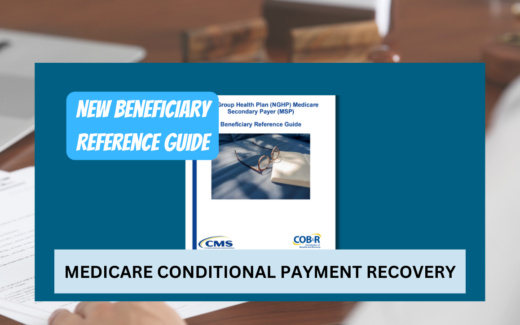Guide Breakdown
On July 19, 2024, The Centers for Medicare and Medicaid Services (CMS) released the first version of the Beneficiary Reference Guide, focused on traditional Medicare conditional payment recovery process.
Guide
The 52-page guide is broken down into 6 parts:
- Introduction to the Medicare Secondary Payer (MSP) for Non-Group Healthcare Plans (NGHP) Recovery Process
- Appeals
- What if You Can’t Repay Medicare?
- Contacting the BCRC
- Additional Resources
Significance of the Guide
The conditional payment process can be complex and confusing for injured parties. This guide serves to educate beneficiaries on benefit coordination, explaining Medicare’s rights of recovery and the responsibilities of the beneficiary. Conditional payments sometimes occur with settlements, and the best approach is to be pro-active.
The MSP program monitors who should be primary to prevent cost shifting to Medicare by NGHP’s such as workers’ compensation and liability claims.
Contractors and Recovery
CMS utilizes two contractors for conditional payment recoveries, depending on the status of the claim. It’s important for beneficiaries to understand debtor status in the eye of CMS.
The Commercial Repayment Center (CRC) is used when a claim is accepted by a carrier on open medical. The CRC evaluates the reported Medicare, Medicaid, and SCHIP Extension Act MMSEA Section 111 Ongoing Responsibility of Medical (ORM) from Responsible Reporting Entities (RREs). The carrier would be considered the debtor and responsible for conditional payments.
Handling Conditional Payments Post-Settlement: A Guide for Beneficiaries
In this article, we will focus on the Benefits Coordination & Recovery Contractor (BCRC) and how conditional payments are handled post-settlement. These aspects tie into the Beneficiary Reference Guide and highlight how the Benefits Coordination & Recovery Center (BCRC) uses MMSEA Section 111 data to manage conditional payments.
The BCRC uses MMSEA Section 111 Total Payment Obligation to the Claimant (TPOC) data to post to the Common Working File (CWF) and manage responsibility for conditional payments when a claim is settled. When a claim settles out medical, CMS considers the debtor as the beneficiary as they received the settlement funds. Beneficiaries may need to check the accuracy of the Sec. 111 data that can impact the conditional payments.
Settling parties should discuss who will be responsible for BCRC conditional payments once the case settles. We see the insurance carriers taking on this responsibility at times and including this language in the settlement. Carriers will evaluate if there are any conditional payments with CRC ahead of settlement.
Note: It’s important to understand that the CRC could come back with $0.00 conditional payment; however, after settlement, the BCRC does a final sweep and determines if conditional payments exist.
Conditional Payment Letters: Who Receives Them?
The BCRC will only send the conditional payment letters to the beneficiary and not to the carrier. We’ve seen situations where the beneficiary thought the carrier was taking care of the conditional payments and their Social Security Disability Insurance (SSDI) benefits were offset for non-payment.
Carrier Communication: Consent Required
For the carrier to communicate with the BCRC, the beneficiary will need to provide written consent for them to negotiate and resolve the lien on their behalf. If the beneficiary is handling the BCRC conditional payment, they need to be mindful of the timelines to respond to each of the conditional payment letters as they are time sensitive. The guide provides the beneficiary with examples of these letters and consent forms in the Appendix.
It's possible for beneficiaries that enrolled in traditional Medicare and later enrolled in MedAdvantage to have liens from both. Beneficiaries are encouraged to work with their part C (Medicare Advantage) and part D (prescription drug coverage) plans to ensure all liens are managed and resolved effectively.
By understanding these key points and following the guidance provided, the beneficiaries can better navigate the conditional payment process and protect their future benefits.
How Ametros Supports Beneficiaries
Post-Settlement Support to Help Navigate Conditional Lien Issues
When an injured party becomes a member post-settlement with Ametros, the industry’s largest and most trusted professional administrator, and receives a Medicare conditional payment letter, Ametros can provide direction on who may be able to assist them. While we do not provide this service, we can provide resources along with the beneficiary guide to assist in resolution.
Understanding What Is and Isn’t Covered by Medicare Post-Settlement
Many injured individuals view their Medicare Set Aside (MSA) as a pool of funds that they can use for their medical care in general, or at least for any type of expense that arises from their injury. In reality, Medicare’s guidelines are very specific. Medicare requires that you only use the MSA funds to pay for the entire cost of medical treatments that are A) related to your injury and B) would be covered under Medicare. Ametros helps beneficiaries understand what they are entitled to as part of their settlement documents and supports individuals with using their MSA funds correctly to remain compliant with Medicare’s guidelines.
Submission of Annual Attestation
Ametros submits all annual Workers’ Compensation Medicare Set Aside (WCMSA) related expenditures for their members, ensuring that the individual remains compliant with CMS’ guidelines, and their benefits are not affected.
If you have any questions, please reach out to us! If you have a future medical case that may require Ametros’ professional administration expertise, please provide a few details with our referral form.
Resource links:
Beneficiary Guide: https://www.cms.gov/files/document/non-group-health-plan-nghp-medicare-secondary-payer-msp-beneficiary-reference-guide.pdf
Medicare Secondary Payer Recovery Portal
BCRC contacts: https://www.cms.gov/medicare/coordination-benefits-recovery/overview/contacts

